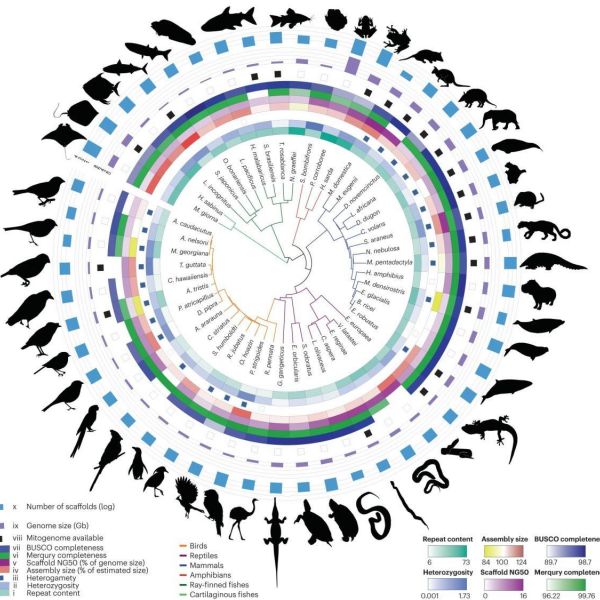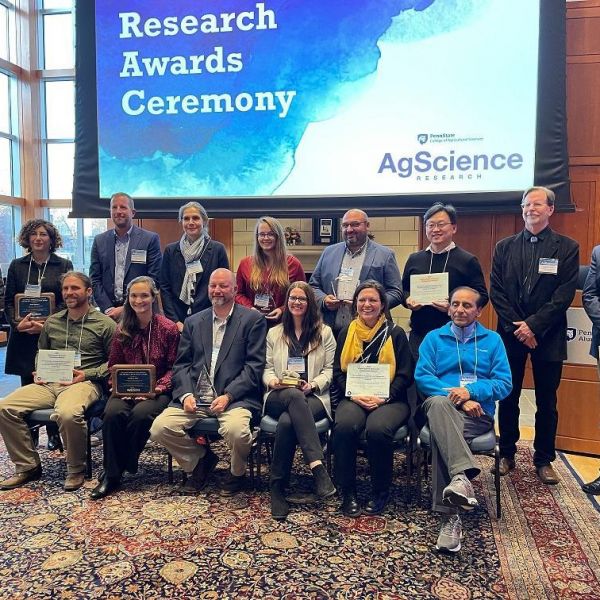News

Feb 22, 2024
Anton Nekrutenko named Huck Chair in Genomics
Anton Nekrutenko, professor of biochemistry and molecular biology in the Eberly College of Science at Penn State, has been appointed as the first Dorothy Foher Huck and J. Lloyd Huck Chair in Genomics.
Full Article

Feb 15, 2024
Lab Bench to Commercialization 2024 grant recipients announced
Four projects led by researchers in the Penn State Eberly College of Science have been selected to receive Lab Bench to Commercialization (LB2C) grants in 2024
Full Article

Feb 09, 2024
Predicting neurodevelopmental disease in children from parent’s traits
Predicting the trajectory of neurodevelopmental and psychiatric disorders like autism or schizophrenia is difficult because they can be influenced by many different genetic and environmental factors
Full Article

Feb 05, 2024
Researchers assemble 51 animal genomes using publicly accessible workflows
Using a new set of tools, an international research collaboration including scientists from Penn State, Rockefeller University and Johns Hopkins University have reconstructed genetic blueprints for 51 species.
Full Article

Nov 28, 2023
College of Ag Sciences recognizes faculty, staff for research achievements
Penn State’s College of Agricultural Sciences lauded outstanding accomplishments in research during the 2023 Research Awards Ceremony, held Nov. 1 at the Hintz Family Alumni Center on the University Park campus.
Full Article

Oct 18, 2023
Manuel Llinás named as the Ernest C. Pollard Professor in Biotechnology
Manuel Llinás, distinguished professor of biochemistry and molecular biology and of chemistry in the Penn State Eberly College of Science, has been named the Ernest C. Pollard Professor in Biotechnology.
Full Article
Oct 09, 2023
Podcast explores impacts of inter-species microbial interactions
Over the past two decades, scientists have discovered that all multicellular life forms on Earth, including human beings, play host to a multitude of microorganisms.
Full Article

Oct 06, 2023
Girirajan named T. Ming Chu Professor of Biochemistry and Molecular Biology
Santhosh Girirajan, professor and interim head of the Penn State Department of Biochemistry and Molecular Biology, has been named the T. Ming Chu Professor of Biochemistry and Molecular Biology.
Full Article

Sep 21, 2023
Huck-supported graduate degree programs transition to new leadership
David Koslicki and Greg Shearer have stepped into the leadership roles for the Huck's Bioinformatics and Genomics (BG) and Physiology graduate programs.
Full Article

Aug 29, 2023
Penn State again named among nation's most LGBTQ-friendly universities
Penn State has once again earned a spot on Campus Pride’s “Best of the Best” LGBTQ-friendly College and Universities list, achieving an overall 5 out of 5 stars in the Campus Pride Index for 2023. Institutions are evaluated on eight LGBTQ-friendly factors, including housing, campus safety, academics, student life, and recruitment and retention efforts.
Full Article